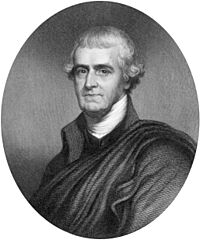Noble Wimberly Jones facts for kids
Quick facts for kids
Noble Wimberly Jones
|
|
|---|---|

Noble Wimberly Jones
|
|
| Born | c. 1723 Lambeth, Surrey, England
|
| Died | January 9, 1805 (aged 81–82) Savannah, Georgia, United States
|
| Occupation |
|
| Spouse(s) |
Sarah Davis
(m. 1755) |
| Children | 14 |
Noble Wimberly Jones (born around 1723, died 1805) was an important doctor and leader from Savannah, Georgia. He was a strong supporter of American independence during the American Revolution. He also represented Georgia in the Continental Congress in 1781 and 1782.
Contents
Early Life and Family History
Noble Wimberly Jones was born in Lambeth, England, around 1723. When he was young, he moved to North America with his parents. They settled in Savannah, Georgia, in 1733. This group was among the first European settlers in the Province of Georgia.
Jones was often called by his full name. This helped people tell him apart from his father, also named Noble Jones. His father became a very important official in the Georgia colony.
Protecting the Colony
As a young man, Jones joined the Georgia Militia. This was a group of citizens who helped protect the colony. He served under James Oglethorpe, who founded Georgia. They worked to keep the province safe from Native American tribes and the Spanish.
Jones became very wealthy, owning thousands of acres of land. This included his large estate called Wormsloe. He also owned rice plantations along the Ogeechee River. These plantations were worked by enslaved people, which greatly added to his income.
Becoming a Doctor
Like his father, Noble Wimberly Jones became a doctor. It seems neither of them had formal training in medicine. In 1755, he married Sarah Davis. They had 14 children together. One of their sons, George Jones, later became a United States senator for Georgia. Noble Wimberly Jones practiced medicine in Savannah from 1756 to 1774.
Political Career Before the Revolution
In 1755, Jones was elected to Georgia's main law-making group. It was called the Commons House of Assembly. He served there until 1775, when the American Revolution began.
Speaking Out for Georgia
After the Stamp Act was passed in 1765, Jones openly criticized British rules. The Stamp Act made colonists pay a tax on many printed materials. In 1768, he was chosen as the Speaker of the House. This meant he led the Assembly's meetings. He even hired Benjamin Franklin to represent Georgia's interests in London.
The Royal Governor, James Wright, saw Jones as a threat. Governor Wright believed Jones was challenging the King's power. Because of this, Wright often closed down the Assembly. But each time, Jones was re-elected as Speaker. And each time, Governor Wright would close the Assembly again.
Leading the American Revolution
In 1775, the British Parliament passed new laws called the Intolerable Acts. These laws angered many colonists. Jones helped create Georgia's own Provincial Congress. This was a new group that aimed to govern Georgia without British control.
Taking Action for Freedom
Jones was chosen twice to be a delegate to the Second Continental Congress. This was a meeting of leaders from all the colonies. However, he could not attend because of the political problems in Georgia. His father was also very ill and died that year. By the end of 1775, Jones was a member of the Council of Safety. This group made important decisions for Georgia.
When news arrived about the first battles of the Revolution, the Battles of Lexington and Concord, Jones and others took action. They raided the colony's gunpowder storage building. It is said that some of this gunpowder was sent to New England. Patriots then used it in the Battle of Bunker Hill.
After the Revolution
In 1776, Governor Wright was forced to leave Georgia. Jones and other revolutionaries took control of the colony. Jones helped write Georgia's first state constitution in 1777. He was then elected Speaker of the new House of Assembly.
Prisoner of War
However, the British recaptured Savannah in 1778. Jones had to flee to Charleston, South Carolina. He continued to practice medicine there. But in 1780, the British also captured Charleston. Jones was taken as a prisoner to St. Augustine, Florida. He was held there until 1781, when he was exchanged for another prisoner. His journey then took him to Philadelphia, Pennsylvania. There, he was appointed as a delegate to the Continental Congress.
In 1782, the British left Savannah. Jones returned home and continued his medical practice. In 1783, he was again elected Speaker of the Georgia House. He also led the state's constitutional convention in 1795. This meeting helped shape Georgia's laws.
Death and Memorial
Noble Wimberly Jones died in Savannah in 1805. He was first buried in his family's tomb in the old South Broad Street Cemetery. This cemetery is now known as Colonial Park Cemetery. Later, in 1880, his grandson moved his remains and those of other family members. They were reburied in a new family tomb at Bonaventure Cemetery.
A memorial honoring Noble Wimberly Jones stands in Savannah's Emmet Park.
See also
- List of speakers of the Georgia House of Representatives
- Wormsloe Historic Site
 | Selma Burke |
 | Pauline Powell Burns |
 | Frederick J. Brown |
 | Robert Blackburn |

